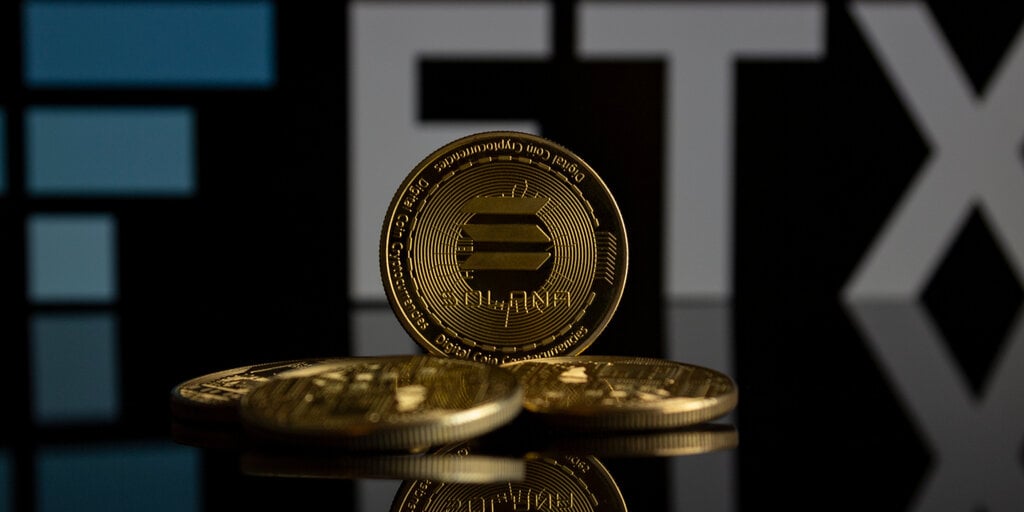Solana is once again the talk of crypto, and its native coin SOL is benefiting from the attention. The price of SOL is up over 9% today, hitting a 24-hour high of $44.41.
Over the past 30 days, it has exploded in value by over 88%, according to CoinGecko—making it the biggest winner of all the major cryptocurrencies.
And despite its association with the collapsed FTX crypto exchange and its criminally convicted founder Sam Bankman-Fried, experts say Solana’s recent rise shouldn’t come as a shock.
Widely considered a competitor to Ethereum, Solana aims to be the go-to network for on-chain applications and experiences. Ethereum proponents argue that the leading smart contract network offers greater stability and security, but Solana is objectively cheaper and faster for those wanting to build or use lending protocols, games, and other applications that utilize blockchain technology.
Solana gas fees right now stand at $0.000522; to make a transaction on Ethereum, it costs $6.58 on average.
For this reason, Solana has grabbed the attention of Visa, Shopify, and developers wanting to build on the network.
“Solana adopts a streamlined approach, emphasizing high base layer throughput while simplifying the developer experience,” portfolio manager at Yield App Akash Mahendra told Decrypt, highlighting how much data can be processed by the blockchain.
Mahendra added that major partnerships and institutional interest are also helping drive up the price of SOL.
It wasn’t that long ago that Solana was getting a bad rep. FTX, once one of the biggest and most recognizable brands in the crypto space, was heavily invested in Solana.
Ex-FTX boss and co-founder Sam Bankman-Fried was a prominent Solana supporter, and the company invested in numerous Solana-related projects. FTX launched a marketplace for Solana NFTs, and even co-created Serum, which at one point was considered a foundation of the Solana DeFi space. At its peak in 2021, Solana commanded a market cap of $78 billion and boasted a $10 billion DeFi ecosystem.
FTX then collapsed in a highly publicized bankruptcy while holding over $1 billion in SOL. The cryptocurrency plunged as a result.
But big players still see real value in the project.
In August, Solana’s payment protocol Solana Pay integrated with the e-commerce platform Shopify, allowing merchants to accept stablecoin USDC via the blockchain. This collaboration “capitalized on Shopify’s influential 10% share in the U.S. online retail sector, which translates to an estimated $444 billion in global transactions,” according to Mahendra.
Then, payments giant Visa announced in September that it had chosen Solana’s blockchain for its stablecoin ambitions. This, according to Solana Foundation’s head of strategy Austin Federa, “validates the importance of the network’s unmatched speed and scalability.”
These two moves were seen as bullish by investors who have since been plugging fresh cash into the project. And things really picked up in the last month.
Patrick Felder, founder & CIO at Prismatic Capital, told Decrypt this was because when Bitcoin and the broader crypto market started rallying, SOL was the most deeply oversold asset in the space following news that FTX’s new management might sell off large amounts of SOL.
But this, according to Felder, was “massively overblown” FUD (fear, uncertainty and doubt) and “triggered a massive short squeeze.” In the world of trading, a short squeeze is when the price of an asset shoots up unexpectedly due to short sellers (those who’ve bet on the asset going down) exiting their positions.
This happened with SOL, according to Felder, as many had bet on Sam Bankman-Fried’s FTX trial hurting the asset’s price.
The Solana community’s annual conference, Breakpoint, took place at the end of October, leading to an even bigger rally, added Felder.
The irony is that at Breakpoint last year, the price of SOL had plunged by 60% in the week following the FTX crash. Spirits were low. But now, the coin has made a stunning comeback.
As always the question is, will it last?
Edited by Ryan Ozawa.













